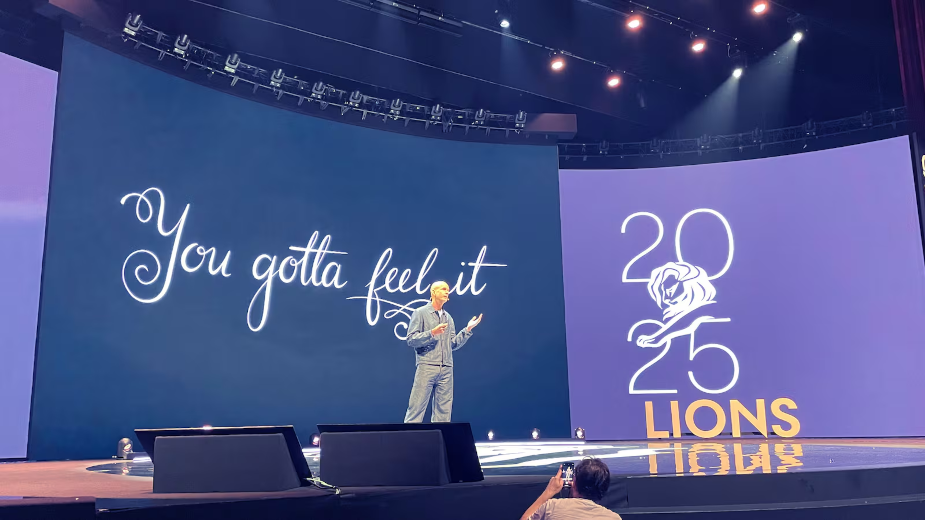
Cannes LIONS Proved That Creativity Still Has a Pulse

Photography by Aaron Baar via Brand Innovators
Cannes LIONS has come and gone, offering a fresh wave of insights into the ever-evolving advertising landscape. While AI dominated much of the pre-show buzz, a renewed focus emerged, emphasising the irreplaceable value of human connection, authenticity and the power of imagination.
This renewed energy was so widespread that even Jasper—a company built on AI for marketing—leaned into highlighting the values of human-first creativity.
In a time where most brands are leaning into the use of AI out of fear of being left behind, the playing field is suddenly levelled. AI is no longer a differentiator; it’s a baseline.
So what does break through the noise of AI? Real ideas. Real moments. Real trust with your audience. According to Globe Media Group, 88% of creative that was submitted in this year’s Cannes Lions steered clear of AI usage. In a digital world of sameness, it’s the distinctly human experiences—like the coffee catchups and beach conversations that Jasper draws from—that set the best work apart. The feelings from those experiences are something that no algorithm, or AI bot, can replicate.
Even brands that tapped into AI at Cannes this year kept their spotlight on people. Take Dove, for example. With Droga5 São Paulo, they brought their iconic 'Real Beauty' campaign into the AI era by tackling the wave of unrealistic beauty standards fuelled by AI. Instead of just talking about it, they acted by retraining algorithms to deliver more inclusive, realistic results across platforms, from chatbots to Pinterest.
Their belief? Marketing can drive algorithmic change. On Pinterest, users were invited to select images that reflected their own definitions of beauty, helping to actively reshape the algorithm and surface more inclusive content in real time, reshaping how they view themselves.
The results spoke for themselves: 4 billion impressions across platforms, 27 million users reached on Pinterest alone, and a 21.4% lift in engagement. Proof that tech can support a movement—when people lead the way. This also won them their Media Grand Prix.
Another example of a brand diving head on into a people-first experience is Pinterest, who took a refreshingly grounded approach. Pinterest used AI not as the main attraction, but as a behind-the-scenes enhancer to elevate the real human experience. At their interactive Manifestival, where their in-house team collaborated with Amplify and Deeplocal, visitors were invited to 'manifest' their future through custom tattoos, NYX, L’Oréal and Maybelline-powered makeup stations, and immersive walks through food and fashion—all rooted in real-world creativity and experience.
By keeping AI in the background and keeping people at the centre, Pinterest created one of the week’s most engaging interactions. During the week of Cannes Lions, the company reported a 50% increase in client meetings and a 40% rise in advertiser interactions.

Even the world’s top brands—like Apple—are doubling down on what matters most: the human experience. At this year’s Cannes Lions, Apple was named Creative Marketer of the Year, thanks to work like Shot on iPhone and the second-gen AirPods.
In a keynote that hit both head and heart, Apple’s VP of marketing comms, Tor Myhren, shared how a personal moment with his father inspired a small but powerful feature—using AirPods as accessible hearing aids. That insight led to a four-year development journey and a product with the potential to help over a billion people.
Myhren drove the point home: in an age of AI, it’s still human creativity that leads. “There’s no AI more capable of making us feel than the human mind,” he said. Pinterest, Dove, Apple and so many more brands succeed because of their passion for the human experience. They’re successful because when tech supports—instead of replaces—the human experience, the results resonate deeper.
One thing is for sure: the human experience is a delicate, irreplaceable thing. You can’t substitute the spark of a real laugh, the power of connection, or the joy of simply being present, with artificiality. Those are things you have to feel, not simulate. AI can be a tool to enhance, but it’s those human moments that make life worth amplifying in the first place.















